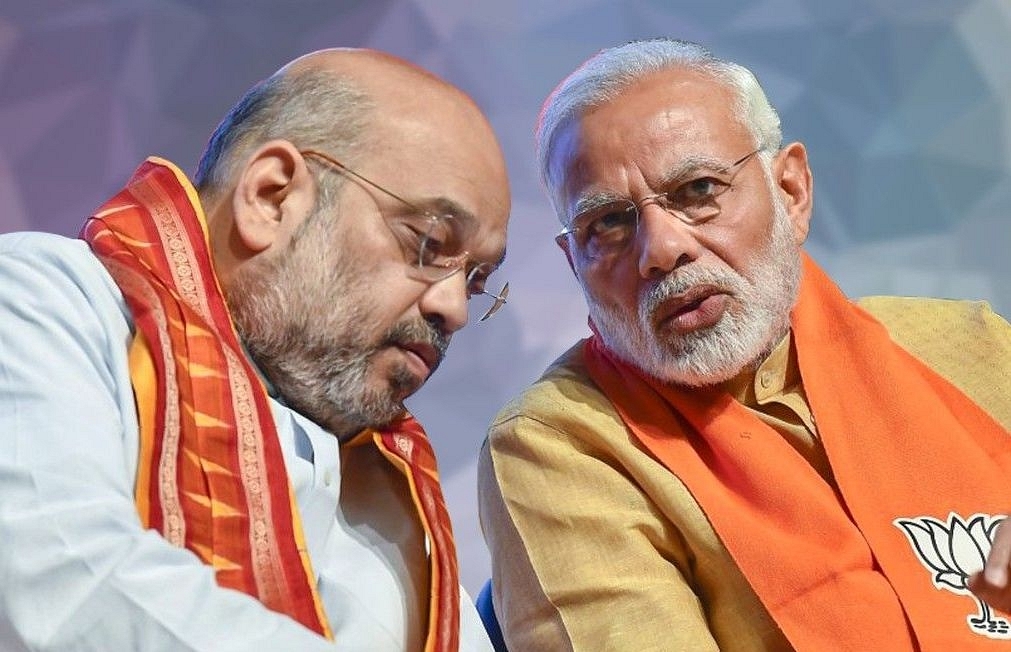Politics
Why Election Rhetoric Has Sunk So Low: It’s Not Just The Economy Stupid
- Modi and Shah are aware that development does not equal electoral success.
- This is the Indian reality and we cannot blame them for trying to beat anti-incumbency using issues other than development.

BJP president Amit Shah with Prime Minister Narendra Modi during a meeting. (Getty Images)
One of the criticisms levelled against Bharatiya Janata Party (BJP) and Prime Minister Narendra Modi is that they have made this election about everything but development, bringing in emotive and extraneous issues. One of these is the labelling of the late Rajiv Gandhi as “Brashtachari No 1” (No 1 in Corruption).
The criticism is partly valid, but what this diversionary tactic on issues suggests is that Modi and his party president Amit Shah know a basic truth about winning Indian elections. You cannot win purely by doing development, just as you can’t win purely by using communal or caste polarisation. You have to do many things to win.
In fact, the intensive efforts by the Congress party to call Modi “chor” and other such efforts to reduce the quality of the debate also suggests the same: his opponents too know that the economic failures of the government alone may not be enough to defeat Modi.
The National Democratic Alliance (NDA) can claim to have done much good by giving the poor many benefits (Jan Dhan, Ujjwala, Saubhagya, personal toilets, PM Kisan, etc), by stepping up reforms (insolvency code, direct benefits transfers, goods and services tax), by keeping fiscal deficits and inflation low, and by investing heavily in infrastructure, especially roads and highways. Even though the performance on jobs may be weak (or difficult to assess without proper data), its overall score on what can be called development is positive. But these factors alone will not ensure that 2019 is in the bag.
Atal Bihari Vajpayee discovered that in 2004, when his reforms and good work resulted in defeat, while the United Progressive Alliance (UPA) won 2009 despite doing no reforms whatsoever. Growth and welfarism did the trick. The lesson Modi and Shah have drawn from this is that you have to do development and also move the voter on more emotive and contentious issues to ensure victory.
Ruchir Sharma, a global investment strategist and author of a book on Indian elections (Democracy on the Road), has pointed out the disconnect between development and electoral outcomes, with good economic performance not being a guarantee of victory for incumbents. The word anti-incumbency is unique to India, where any party in power loses sheen no matter how well it delivers on growth or prosperity. Caste, religion, welfarism, perceptions on corruption, and family connections play a part along with “development”.
Sharma told Swarajya in an interview: “So that is the fascinating part of Indian politics. That you can’t win an election based only on development, but if you don’t do development you can pay a price, as Lalu eventually did in Bihar. Winning an election banking only on development is tough, for it is only one of the tests you have to pass. Even caste is not a sufficient condition on its own, but if you get caste equations wrong then you have no hope in hell.”
Another study, a small summary of which was published by Mint today (10 May), by Tanushree Goyal of Oxford University, also debunks any straightforward connection between a government’s development work and voter enthusiasm for it.
No government in India has spent so much money in expanding the National Highways and especially the rural roads network (the Pradhan Mantri Gram Sadak Yojana, or PMGSY, which was started by Vajpayee), but this may not be enough to get the rural or urban vote.
Goyal looked at road-level data under PMGSY and election results between 1998 and 2017 in 14 large states – a humongous construction of 180,000 all-weather rural roads connecting 600,000 villages that could not but have benefited from it all – but electoral outcomes were not impacted by this. This construction did not benefit either state- or central-level incumbents.
The fact that at least four initiatives – the 10 per cent non-caste-based reservations, the Citizenship Amendment Bill, the PM Kisan doles for small and marginal farmers, and tax benefits for the middle classes – came only in the last two months before the general elections suggests that both Modi and Shah are aware that development does not equal electoral success. This also partially explains their decision to bring up emotive issues repeatedly in their campaigns.
This is the Indian reality and we cannot blame them for trying to beat anti-incumbency using issues other than development.
Introducing ElectionsHQ + 50 Ground Reports Project
The 2024 elections might seem easy to guess, but there are some important questions that shouldn't be missed.
Do freebies still sway voters? Do people prioritise infrastructure when voting? How will Punjab vote?
The answers to these questions provide great insights into where we, as a country, are headed in the years to come.
Swarajya is starting a project with an aim to do 50 solid ground stories and a smart commentary service on WhatsApp, a one-of-a-kind. We'd love your support during this election season.
Click below to contribute.
Latest